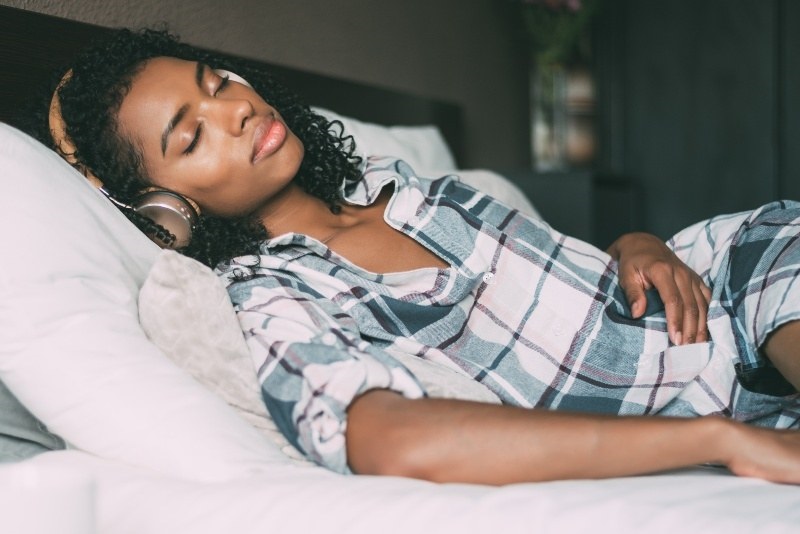- Home
- Mind & body
- Does drifting off to the sound of sleeping music seem like a dream?
At CBHS we help you manage your health challenges. We believe in offering you the services, support and tools you need to live your best life.
Health and Wellness Programs are available to support eligible members towards a healthier lifestyle. Each Health and Wellness Program is subject to its own eligibility criteria.
Contact us for more information and to confirm your eligibility for a program.
Does drifting off to the sound of sleeping music seem like a dream?

We all know how powerful and transformative music can be. It can make you dance, fall in love and maybe even do the house chores faster! But did you know, music is also a great way to help you feel relaxed and more rested for a better night’s sleep?
Parents know all about the soothing qualities of a lullaby for helping babies and even toddlers fall asleep. The great news is that babies aren’t the only humans who can enjoy the dreamy benefits of relaxing music at bedtime. In fact, people of all age groups can enjoy an improved quality of sleep after listening to music. And the more you make evening melodies a habit, the easier it may feel for you to unwind after a long day.
Is sleeping music really a quick-fix for falling asleep?
It’s not necessarily a quick-fix or a cure-all for any sleep issues you may be experiencing right now. But when it comes to placing you in a relaxing, calm mood for sleep, music can work wonders.
A calming addition to your routine, music can be a simple way for you to ease your way into bedtime and settle your mind after dealing with the day’s endless to-do lists, family and work commitments.
So if you haven’t thought of it as ‘a thing’ before – why not make this month the time to experiment with a couple of relaxing melodies before you get some shut-eye?
The silver bullet for deep sleep? The science behind music and snoozing
Well known sleep studies have shown that listening to music at bedtime, or just prior, is an effective sleep aid. For some adults living with insomnia, listening to soothing music for 45 minutes at bedtime improved their ‘rested’ rating scores and prolonged REM sleep. Meanwhile, in a study involving young adults, sedative music improved their quality of sleep by prolonging their deep sleep phase.
A 2018 study set out to build on these findings and discover more about the relationship between sleep and music. For example, how many of us use music to fall asleep, and what kind of music is best for sleeping? Interestingly, the majority of us are doing this:
- 62% of people surveyed use music to aid their sleep, although this was weighted towards younger people who engaged with music more
- Researchers found that sleeping music tastes were diverse.
Ultimately, we all have our own preferences for the best music to fall asleep to.
However, a new study from the University of NSW has uncovered more on the specific features of music that helps us to fall asleep.
UNSW PhD student and music psychology researcher, Thomas Dickson, elaborates,
“Music has a solid evidence base as one of the better researched non-pharmacological sleep aids that can improve individual’s sleep, both in terms of insomnia and the quality of sleep.”
According to his recent research, turning on a little bedtime music can reduce the stress some of us may feel when we’re trying to fall asleep at night. It turns a challenging situation into a pleasurable experience: the music can distract you and induce a sleepier state while ‘covering up’ or masking the noises around you.
The study confirmed it’s not necessarily about the genre of music you listen to. In fact, participants listed 11 different genres they’d successfully used as sleeping music. It may actually be more about the specific features which the music includes.
For instance, music that aided sleep had more emphasis in lower frequencies like a stronger bass, a slow and sustained duration of musical notes and ‘non-danceable’ rhythms. For example, Debussy’s Clair de Lune and Beethoven’s Moonlight Sonata were green-lit, while System of a Down’s Chop Suey and Roxanne by The Police were perhaps too ‘danceable’.
Dickson recommends creating a playlist of music you enjoy, which fits with the sleep-compatible features. He also suggests limiting the volume to 40 decibels for best results.

The Sleep Foundation also has good tips for creating a sleeping music routine:
- Choose music you like which is around 60-80 BPM (beats per minute). Our resting heart rate is generally between range 60 to 100, and it’s thought that the body may sync up with slower music.
- When you find the perfect playlist, make it a habit – routine is good for sleep! Sleep music can also have a cumulative effect, the more often you use music, the better you may sleep.
- Steer away from songs that trigger strong emotional reactions – we all have certain songs which can elicit these, so they’re probably not the best sleeping music choices.
- A small speaker or stereo may be safer for you – and more comfortable – than earbuds or headphones. But make sure these don’t emit bright lights which may disturb your sleep!
“From gentle rainfall to sleep meditation music, there are currently dozens of musical sleep apps to choose from.”
Putting it into practice: A world of sleep music apps at your fingertips
With the easy availability of good quality portable speakers and sleeping music apps for every taste, there’s never been a better time to add a calming tune or two to your bedtime routine.
You’ll find a wide range of sleep music apps to choose from that incorporate meditation, the sounds of a humming savannah at night and even gentle rainfall. It’s entirely up to you and what you believe will relax you the most.
Selecting music for sleeping tonight? Here’s some inspiration…
- Sleep meditation music
- Nature sounds
- Buddhist chants
- Heavy rain sounds.
You can also look at Dr Thomas Dickson’s ‘The Best Spotify Music Playlist For Sleep’ based on the results of his recent study.
Anyone who has listened to rain on a tin roof would probably agree that melodies which combine the sound of falling rain can be some of the most relaxing music to sleep by. It’s almost like listening to white noise, after a while, it just washes over you and it feels like silence mainly because you’ve drifted off to sleep!
Let’s take a closer look at sleep meditation music
Sleep meditation music is a popular choice for sleep music, and you’ll find a wide range of YouTube playlists dedicated to the genre. Mental health non-profit organisation Headspace, says that in scientific terms, meditation helps lower the heart rate by activating our parasympathetic nervous system and encouraging slower breathing. This helps increase the chances of a quality night’s sleep.
Sleep meditation may be guided or not. Guided means there’ll be audio to take you on the journey, maybe through some breathing exercises, mindfulness, or by activating different muscles. It might help to switch your mind off because all you need to do is follow along. Unguided sleep meditation allows you to go at your own pace, and may simply contain relaxing sounds, calming music, or both. An unguided sleep meditation can be as simple as breathing in while counting to four and breathing out while counting to four. This is called ‘box breathing’; a simple and easy meditation practice you can use anytime through the day to restore calm.
Whichever option you choose, the goal is to allow the mind to drift off in a soft and gentle way so it can relax – along with your body. It’s not about trying to force sleep, but letting go of thoughts, words, and tension of the day.
A quick recap on the power of sleep
Sleep is one of the most amazing things you can do for yourself – even beyond eating a healthy diet! A deep night’s sleep doesn’t just affect your energy levels the next day it can also impact your mental and physical health.
Begin a better sleep routine tonight and you’ll be on your way to improving:
- stress levels
- memory
- learning
- focus
- immune system
- weight management
- longevity
- hormone levels and much more.

Can you skip on good sleep?
You can, but it’s not a smart choice! Sleep experts recommend that adults get 7-9 hours of sleep every night. Skimping on your sleep will lead to sleep deprivation which can weaken your immune system and put you at a higher risk of chronic conditions such as obesity and type 2 diabetes.
“You can improve the quality of your sleep with a little relaxing music at bedtime, helping you unwind and calm your mind…”
Need a little more help with your sleep than you thought?
Maybe sleeping music or even meditation isn’t the answer to your sleep concerns right now. Perhaps you’re dealing with a sleep disorder like insomnia or sleep apnoea. If this sounds like you, set up a time to speak with your GP for a closer look at your sleep issues.
Taking a musical approach to a great night’s sleep
Believed to be the highest form of self-care, sleep plays such an important role in your physical and mental health. And music that helps you achieve a deep sleep could be the key to catching more zzzzz tonight. Some of the most relaxing music for sleep is available right now via an app or online. All you need to do is a little research, maybe try a couple out over the next few nights and see what works best for you. There are some great sleep music or sleep meditation apps which are low-cost, and even offer free trials to see if it’s a match for you. Or, why not experiment with some of your own playlists and see if you can find your preferred deep sleep music.
Ultimately, you don’t need to be a newborn or toddler to enjoy the relaxing benefits of calming lullabies, music and soothing sounds at bedtime. Listening to music moments before sleep could mean the difference between a restless night and a deep, restorative sleep your body – and mind – will thank you for!
All information contained in this article is intended for general information purposes only. The information provided should not be relied upon as medical advice and does not supersede or replace a consultation with a suitably qualified healthcare professional.
Sources:
https://www.cbhs.com.au/mind-and-body/blog/the-abcs-of-meditation-for-kids
https://www.cbhs.com.au/mind-and-body/blog/embracing-the-natural-flow-of-life-with-meditation
https://www.healthdirect.gov.au/sleep
https://newsroom.unsw.edu.au/news/social-affairs/study-reveals-relaxing-music-help-you-sleep
https://www.sleepfoundation.org/bedroom-environment/how-to-design-the-ideal-bedroom-for-sleep
https://www.headspace.com/meditation/sleep
https://pubmed.ncbi.nlm.nih.gov/22494532/
https://pubmed.ncbi.nlm.nih.gov/23663079/
Health and wellbeing
programs & support
You Belong to More with CBHS Hospital cover:
- Greater choice over your health options including who treats you
- Get care at home with Hospital Substitute Treatment program
- Free health and wellbeing programs to support your health challenges
Live your healthiest, happiest life with CBHS Extras cover:
- Benefits for proactive health checks e.g. bone density tests, eye screenings
- Keep up your care with telehealth and digital options
- Save on dental and optical with CBHS Choice Network providers
